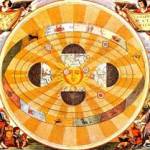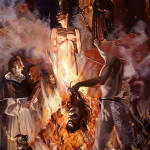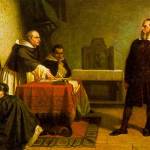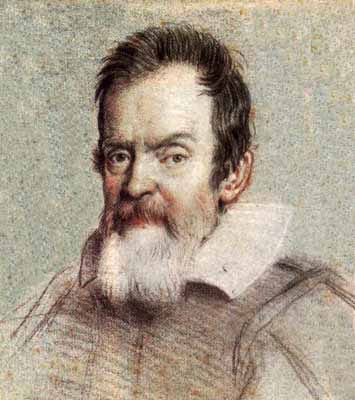[In my Introduction to Philosophy course this week, we are reading and discussing Galileo Galilei’s attempt to reconcile the new science with traditional religion. The text of his Letter is at my Texts in Philosophy page.]
In his open letter to the Grand Duchess Christina (1615), Galileo offered a defense of science against the prevailing heavy hand of religious orthodoxy:
“But I do not feel obliged to believe that that same God who has endowed us with senses, reason, and intellect has intended to forgo their use and by some other means to give us knowledge which we can attain by them. He would not require us to deny sense and reason in physical matters which are set before our eyes and minds by direct experience or necessary demonstrations.”
The immediate context was the great debate over the geocentric and heliocentric models. The larger context was the tension between religious philosophy, which stressed faith in revelation and tradition, and Renaissance philosophy, which stressed observation and reason. How, for example, should we decide whether the earth or the sun is at the center of our cosmos? Should we trust the views handed down to us by the best theologians over the centuries,  those views derived primarily from Scripture? Or should we trust the views presented to us by scientists, their theories based on observational data from telescopes and other instruments and mathematical calculations of that data?
those views derived primarily from Scripture? Or should we trust the views presented to us by scientists, their theories based on observational data from telescopes and other instruments and mathematical calculations of that data?
The traditionalist position was that reliance on observation and reason — when that conflicts with Scripture and tradition — is heresy. Giordano Bruno was convicted and executed, in part, for such heresy. When reason conflicts with faith, reason must give way. Or else.
Galileo’s solution is to argue that God wrote Scripture, of course, so Scripture contains the truth — and that God also created nature, and so nature also contains truth. God also created us humans, giving us sense organs and intelligence. So we can study Scripture rationally and learn important truths, as theologians do. But we can and should study nature rationally and learn important truths, as scientists do. And since both Scripture and nature come from the same author — God wrote two books, so to speak — the best theology and the best science should be compatible.
 Consequently, the real heretics are those who place faith over reason and who use apparent theoretical conflicts as a pretext for persecuting or killing their intellectual opponents. The truly devout, by direct contrast, are those who use their best intelligence, as God intended when He gave it to us, to try to understand the universe and who, when intellectual conflicts arise along the way, use reasonable methods — discussion, debate, and further investigation — to resolve them.
Consequently, the real heretics are those who place faith over reason and who use apparent theoretical conflicts as a pretext for persecuting or killing their intellectual opponents. The truly devout, by direct contrast, are those who use their best intelligence, as God intended when He gave it to us, to try to understand the universe and who, when intellectual conflicts arise along the way, use reasonable methods — discussion, debate, and further investigation — to resolve them.
I call this “the modern compromise” because versions of it are also found in Francis Bacon, René Descartes, and John Locke. In Galileo’s version, the intellectual turf is divided into two realms — the natural and the supernatural — and as long as scientists and theologians stick to their own turf, there should be no problems.
Locke uses the same dualist point is used to argue for the separation of church and state: “The boundaries on both sides are fixed and immovable. He jumbles heaven and earth together, the things most remote and opposite, who mixes these two societies, which are in their original, end, business, and in everything perfectly distinct and infinitely different from each other” (A Letter concerning Toleration [1689]).
So the early modern compromise is to use a strong metaphysical dualism to separate the natural and the supernatural, the realm of science and the realm of religion, the scope of the state’s power and the scope of the church’s, the physical and the spiritual, the factual and the moral. As long as everyone stays on their side of the line, we can avoid conflict.
I sometimes wonder to what extent the dualism was a genuine metaphysical claim by these founding modern thinkers — and to what extent it was a tactical claim to create a safety zone for naturalistic life and inquiry, given the often-dangerous religious orthodoxies of the time.
Despite having lost much of Europe to the Protestants over the preceding century, the Catholic Church was far from toothless, especially in southern Europe, and in 1616 it issued a Codex with a formal response to Galileo’s argument and the threat of heliocentrism:
“Propositions to be forbidden: That the sun is immovable at the center of the heaven; that the earth is not at the center of the heaven, and is not immovable; but moves by a double motion.”
Thus the stage was set for continued tension on both sides and Galileo’s trial for heresy in the 1633.

Was not this just Augustine of Hippo (On Christian Doctrine) rebooted? In fact, Augustine went further — Scripture was the indirect creation of God, the world was the direction creation of God so, in any divergence between the two, the world took precedence.
im so confused. so what is the conflict resolution? I need this for my project